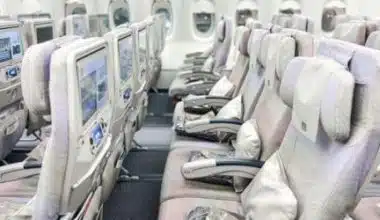Imagine having all the benefits of owning a private jet without the complexities and costs of full ownership. That will be incredibly outstanding. Being part of the decision-making forum where you decide how you want your business to run as a business owner or how you want to use your Jet. This decision on the control and ownership of a fractional jet can be based on certain factors like the type of company, company value, finance contributed, type of partner shares, and other important factors. Here, we’ll give details on the important information you should look out for.
Fractional Jet Ownership
Fractional jet ownership is a type of ownership arrangement where multiple individuals or companies share ownership of a single private aircraft. Each owner is allocated a certain percentage of the aircraft, which is represented as shares or fractions. The owners then have the right to use the aircraft for a certain number of hours or days per year, depending on their ownership share. Fractional ownership is perfect for those wanting the luxury and convenience of flying privately but who do not want the hassle and expense of owning a jet.
How Fractional Jet Ownership Works
Fractional jet ownership works by dividing the ownership and usage of a private aircraft among multiple individuals or companies.
Here is how it works.
#1. Purchase or Lease
Interested parties buy or lease a share or fraction of the aircraft from a fractional ownership program provider. The size of the share can vary, ranging from 1/16th to 1/2.
#2. Allocation of Usage
Each owner is allocated a certain number of flight hours or days per year based on their ownership share. The allocation may be fixed or flexible, depending on the program. Some programs use a day-based model, while others use an hour-based model.
#3. Scheduling and Reservations
Owners can schedule their flights based on their allocated usage. They may need to make reservations in advance, subject to availability. Some programs offer online scheduling systems or dedicated customer service representatives to assist with flight arrangements.
#4. Costs and Fees
Owners are responsible for paying a share of the operating costs, which may include fuel, maintenance, crew expenses, and management fees. The specific costs and fees can vary depending on the program and the aircraft.
#5. Aircraft Management
Fractional ownership programs often include management services, such as maintenance, crew, and flight planning, which are taken care of by the program provider. This relieves owners of the administrative and logistical responsibilities associated with aircraft ownership.
#6. Additional Services
Fractional ownership programs may offer additional services and benefits, such as personalized concierge services, access to exclusive airport facilities, and customization options for the aircraft’s interior.
#7. Exit Strategy
Most fractional ownership programs have options for owners to exit the program. This may involve selling their share back to the program provider or other potential buyers in the market.
Fractional Jet Ownership Pricing
The pricing for fractional jet ownership can vary depending on several factors, including the size and type of aircraft, the program provider, and the specific terms of the ownership agreement.
The pricing range of Fractional Jet Ownership includes:
#1. Initial Investment
The initial purchase price for a share can range from around $100,000 to several hundred thousand dollars, depending on the size and type of jet. A one-sixteenth share of a light jet may start between $300,000 and $600,000.
#2. Operating Costs
Owners are responsible for paying a share of the aircraft’s operating costs, which can include fuel, maintenance, crew expenses, and management fees. These costs are often calculated based on flight hours or days of usage. If the hourly operating cost is $2,000 and an owner is allocated 50 flight hours per year, the annual operating cost would be $100,000.
#3. Monthly Expenses
In addition to the initial investment and annual operating costs, owners may be required to pay monthly management fees. These fees can vary but may start at around $9,000 per month.
#4. Variable Hourly Rate
Some fractional ownership programs have a variable hourly rate that covers fuel, maintenance, and crew expenses associated with each flight hour. The specific expenses included in the hourly rate may vary by program.
Fractional Jet Ownership Companies
Several companies offer fractional jet ownership programs, including Flexjet, NetJets, and Airshare, among others. These companies provide a range of aircraft options, program structures, and additional services to meet the needs of fractional owners.
#1. NetJets
NetJets is one of the largest and most well-known fractional jet ownership companies. They offer shares in a wide range of aircraft, including various models from manufacturers like Bombardier, Cessna, and Gulfstream. NetJets provides a comprehensive range of services and benefits to their owners.
#2. Flexjet
Flexjet is a fractional jet ownership company. They offer shares in a diverse fleet of aircraft, including options from Bombardier, Embraer, and Gulfstream. Flexjet provides a personalized approach to travel and offers exclusive extras through its Red Label program.
#3. Jet It
Jet It is a fast-growing fractional jet ownership company that focuses on HondaJets and Phenom 300s. They offer unique features such as day-based programs and assistance for owners who are pilots to become type-rated in the HondaJet.
#4. Nicholas Air
Nicholas Air provides fractional ownership, leases, cards, and aircraft management services. They operate a range of aircraft, including the Pilatus PC-12, Phenom 100 and 300, Citation CJ3, Citation Latitude, and Challenger 300.
#5. AirSprint
AirSprint is a Canadian-based fractional jet ownership company with a fleet of over 20 aircraft, including models from Embraer and Cessna.
#6. VistaJet
VistaJet offers a global fleet of luxury private jets for fractional ownership. They provide access to a variety of aircraft, including Bombardier Global and Challenger models.
Airshare is a fractional jet ownership company that operates in the central United States. They offer shares in the Embraer Phenom and Beechcraft King Air aircraft.
#8. PlaneSense
PlaneSense specializes in fractional ownership of the Pilatus PC-12 turboprop aircraft. They have been in operation for over 25 years and offer a range of ownership options.
Executive AirShare provides fractional ownership and membership programs for private jet travel. They operate a fleet of Phenom 100 and Phenom 300 aircraft.
#10. Magellan Jets
Magellan Jets offers fractional jet ownership and jet card programs. They have a diverse fleet of aircraft, including options from manufacturers like Gulfstream, Bombardier, and Cessna.
Best Fractional Jet Ownership
The best fractional jet offers a combination of factors like access to a diverse fleet, excellent service, favorable terms, and a high level of convenience, making it an attractive choice for those seeking a share in private jet ownership. The program depends on individual preferences and needs. Popular programs include NetJets, Flexjet, Jet It, VistaJet, and Airshare. These programs offer diverse aircraft, exceptional service, and global networks. Factors like aircraft type, service level, pricing, location, and additional benefits should be considered when choosing a program.
Benefits of the Best Fractional Jet Owners
The benefits of the best fractional jet ownership programs can vary depending on the specific program and individual preferences. Each program may offer unique benefits and features, so consider factors such as aircraft availability, service quality, pricing structure, and additional perks offered.
The benefits include:
#1. Guaranteed Availability
Fractional jet ownership programs offer guaranteed access to an aircraft, allowing owners to fly on short notice without worrying about availability.
#2. Cost Savings
While owning a private jet outright can be expensive, fractional ownership allows individuals to share the costs with other owners, making private jet travel more affordable.
#3. Flexibility
It provides flexibility in terms of aircraft selection and flight hours. Owners can choose from a range of aircraft types and sizes based on their specific needs and can often customize their flight schedules.
#4. High-Quality Service
Reputable fractional jet ownership programs prioritize providing exceptional service to their owners. This can include personalized travel planning, dedicated crews, and access to luxurious amenities.
#5. Access to a Global Network
Many fractional jet ownership programs have a wide network of destinations, allowing owners to travel to various locations around the world.
#6. Reduced Hassle
Fractional ownership programs handle maintenance, scheduling, and other operational aspects, reducing the administrative burden on owners.
Fractional ownership allows owners to share the expenses of aircraft acquisition, maintenance, and operating costs, making private jet ownership more cost-effective.
#8. Potential Tax Benefits
Fractional ownership may offer certain tax benefits in terms of depreciation and operating expenses. It is important to consult with a tax professional to understand the specific tax implications.
#9. Privacy and Security
Fractional ownership provides a higher level of privacy and security compared to commercial flights. You have control over who flies with you, reducing the likelihood of encountering unfamiliar passengers.
#10. Customization
These programs often offer customization options for the interior of the aircraft, allowing you to create a personalized and comfortable flying environment that suits your preferences.
Fractional Jet Ownership Cost Comparison
Fractional jet ownership cost comparisons are the process of evaluating and analyzing the expenses associated with fractional ownership of private jets. It involves comparing the financial aspects of different fractional ownership programs or providers to determine which one offers the most favorable cost structure. When comparing the costs of fractional jet ownership, consider several factors, such as the initial investment, operational expenses, and the size of the fractional share.
These are cost comparisons of Fractional Jet Ownership
- The initial investment for fractional jet ownership can range from $300,000 to $600,000 for a one-sixteenth share of a light jet.
- Operational expenses can vary depending on factors such as the type of aircraft and the number of flight hours. For example, the monthly operational expenses for a one-sixteenth share of a very light jet can be around $5,950.
- Fractional jet ownership can be more cost-effective than full aircraft ownership if you fly fewer than 400 hours a year.
- The total cost for 300 hours of fractional jet ownership can range from $2,031,750 to $2,897,523, depending on the program. In comparison, the total cost for 300 hours of private jet charter can range from $2,031,750 to $3,312,000.
Disadvantages of Fractional Jet Ownership
Fractional ownership has several disadvantages that potential owners should consider before entering into a contract. They include:
#1. High Costs
Fractional ownership has high costs, including significant upfront investment, ongoing maintenance, management, and flight fees, which can add up over time, depending on the size of the ownership share and aircraft type.
#2. Limited Aircraft Choice
When opting for fractional jet ownership, you are limited to the aircraft available within the specific program or provider. This means that you may not have access to a wide range of aircraft types or models.
Another disadvantage of fractional jet ownership is the potential lack of availability of the aircraft when you need it. Since you are sharing the aircraft with other owners, there may be limitations on its availability during peak travel times or busy periods.
#4. Lack of Control and Flexibility
As a fractional owner, you have less control and flexibility compared to full ownership. You may have to coordinate with other owners to schedule flights and may not have complete control over the aircraft’s operations and maintenance. Additionally, there may be restrictions on selling your ownership share before the contract term is over.
#5. Lower Value Over Time
Over time, the value of fractional ownership shares may depreciate. The market for fractional jet ownership can fluctuate, and the value of the ownership share may decrease, potentially resulting in a lower return on investment if you decide to sell your share in the future.
#6. Limited Flexibility in Destinations
Fractional jet ownership programs have a limited number of base locations from which flights can originate. This can restrict your ability to fly to certain destinations that are not within the program’s operational range. If your desired destination is outside the program’s coverage area, you may need to arrange for additional flights or alternative transportation to reach your final destination.
#7. Potential for Disputes and Conflicts
Fractional jet ownership involves sharing assets with other owners, causing potential disputes over scheduling, maintenance, and operational matters. Resolving these disputes can be time-consuming and require mediation or arbitration.
#8. Limited Customization Options
Fractional ownership programs often have limitations on customization options for the aircraft. If you have specific preferences or requirements for cabin layout, amenities, or design, you may not have the freedom to fully customize the aircraft to your liking. This can be a disadvantage if personalization is important to you.
#9. Potential for Additional Fees
While fractional jet ownership contracts outline the costs involved, there can still be additional fees that may arise unexpectedly. For example, there may be charges for repositioning the aircraft to a different location, fees for exceeding the allotted flight hours or flight distance, or fees for specific services not included in the standard contract.
#10. Limited Tax Benefits
Fractional jet ownership may not offer the same tax benefits as full ownership. Tax deductions and benefits associated with aircraft ownership may be limited or not fully available to fractional owners. It’s important to consult with a tax professional familiar with aviation tax regulations to understand the specific tax implications of fractional ownership in your jurisdiction.
How Much Is Fractional Ownership In A Jet?
The cost of fractional jet ownership can vary depending on factors such as the aircraft size, flight hours desired, and the specific program or provider. Initial investments range from a few hundred thousand dollars for a smaller share in a small jet to several million dollars for a larger share in a high-end aircraft. Additional costs include annual operating expenses like maintenance, insurance, and fuel, divided among the owners based on their share.
How Does Jet Fractional Ownership Work?
Fractional jet ownership involves purchasing a share of an aircraft, typically in increments such as 1/16th, which grants the owner a certain number of occupied hours. The owner becomes a co-owner of the aircraft and is entitled to use it for a designated amount of time. The costs associated with fractional ownership include the initial investment for the share and ongoing operating expenses such as maintenance, insurance, and fuel. Fractional ownership programs are professionally managed, providing convenience and access to private air travel.
What Is Fractional Private Jet Ownership?
Fractional private jet ownership is a form of co-ownership where multiple individuals or entities purchase shares in an aircraft. Each owner has the right to use the aircraft for a designated amount of time based on their ownership share. Fractional ownership programs are professionally managed, providing owners with access to private air travel without the logistical responsibilities of full ownership. This arrangement allows for cost-sharing of expenses such as maintenance, insurance, and crew salaries. Fractional ownership offers flexibility and convenience, making private jet travel more accessible to individuals who fly frequently but may not require full ownership.
What Is The Best Fractional Jet Ownership Program?
Determining the best fractional jet ownership program depends on individual needs and preferences. However, some well-known and reputable fractional jet ownership providers include NetJets, Flexjet, and Airshare. NetJets is one of the largest and most established fractional jet ownership programs with a wide range of aircraft options and global coverage. Flexjet offers personalized experiences and extras, such as their Red Label program. Airshare utilizes a day-based model instead of an hour-based model, providing more flexibility and unlimited flight hours in a day.
What Is The Cheapest Private Jet?
The cheapest private jet currently available on the market is the Cirrus Vision Jet. It has a starting price of around $2 million. The Cirrus Vision Jet is a single-engine aircraft with a unique V-tail design. It can accommodate up to 12 passengers and has a range of approximately 1,150 miles. Other affordable private jet options include the Phenom 100EV and used private jets that can be purchased for as low as $200,000.
How Many Hours Is A Fractional Jet Ownership?
Fractional jet ownership offers a total of 800 hours of operating time per year. This means that the owners collectively have access to 800 hours of flying time for the aircraft they co-own. However, the specific number of occupied hours allocated to each shareholder may vary depending on their ownership share and the terms of the fractional ownership program.
Conclusion
Fractional jet ownership is a system where multiple people can split the cost and benefits of jet ownership. Each shareholder is allotted a specific number of occupied hours per year that they can use to fly the aircraft. Fractional ownership provides almost all the same tax advantages as full aircraft ownership, minus the burdens of hiring a crew and arranging maintenance and storage, among other things. Fractional jet ownership pricing varies based on aircraft size, type, program provider, and agreement terms. Initial investment, operating costs, monthly expenses, and variable hourly rates are key factors. These companies offer a personalized approach to travel and exclusive extras. These factors should be considered before entering into a contract, as they can impact the return on investment, flexibility in destinations, potential for disputes, and potential tax implications. Consult a tax professional for specific tax implications.
- NETJETS PRICING: ALL YOU NEED TO KNOW
- HOW MUCH IS A TRIP TO HAWAII?Detailed Guide
- WHAT IS A CHARTER FLIGHT? Features and Costs
- IS DISNEY VACATION CLUB WORTH IT? All You Need To Know
- HOW TO LIST ON AIRBNB: The Ultimate Guide






